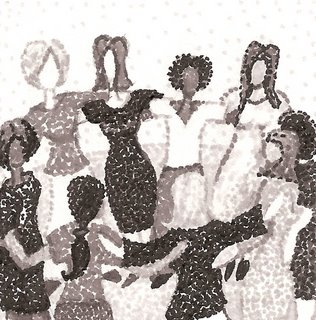
See Instalment 4 here
Now he was at the Battery Bistro, renamed La Vista in its latest incarnation, at the end of Harbour Drive, overlooking the Tickle. The booths were no longer a burgundy velvet, they were a Mexican print. The special of the day was burritos. He made his way to the back and sat in the same old dark corner. It was early, too soon for lunch. He ordered a coffee and then signaled the waitress and added an Irish whiskey and tossed it back like she would have and ordered another and did the same.
He left a twenty on the table and went up the hill to Boston Way. Far too soon, would she be there yet? It said two on the paper. It wasn’t even noon.
There was a notice outside. At rest - what rubbish - Una Doyle and the visitation hours listed underneath. He entered the hush of the place. The thick carpets. The strange smell, he could never identify the components of a funeral home smell. Nothing as crude as formaldehyde, but subtler, a cocktail mix of the hothouse flowers, the wood, the candles, the paper of all the cards, the beeswax polish.
Can I help you? The murmur came from his left at an entrance to a large room. There was a casket being arranged at the far end. There were a lot of flowers around. She was an older lady, his age, she looked both familiar and in charge and she confirmed it by telling him she was Leona Darcy, the funeral director, and he remembered her from church and reminded her of their connection and she immediately shifted into a more intimate helpfulness and first name terms.
A client of mine, he said confidentially, here to pay my respects. Una Doyle.
Ah, she said, right Richard. That’s not till two, but she’s here and her daughters are here and her brothers, and her mother too, private family viewing and arranging at the moment, but hang on and I’ll get the girls and she was gone before he could stop her and thought to race out the door but Leona knew him now and how odd would that be, so he stayed rooted to the spot, not knowing what to do with his hands so shoved them, gloves and all, into his pockets and pursed his lips into a whistle type arrangement but thought better of it.
The girls. There they were in front of him now. Identical twins. Una’s hair. The dimple on her lower lip. But blue eyes. Taller than Una. They offered him friendly, puzzled smiles. He removed his cap and gloves to shake their hands and followed them into a small coffee room at the back of the funeral home.
When did you know Mum? Elspeth said. Elspeth was in yellow and Isobel was in blue.
The time of the divorce, and then I saw the notice in the paper today….his voice trailed off.
They looked blankly at him.
Richard Kelly, he offered helpfully, I was her, and he paused, her lawyer.
Which divorce? Asked Isobel, the one in blue.
Oh, said Richard, taken aback, the one from your father?
Three marriages ago, Elspeth giggled, looking at her sister.
Mother and marriage! and Isobel rolled her eyes, she was even going to try it again and then the cancer came a year ago. Lung. From all those Players.
Richard tried to gather his thoughts and failed, they were scattering everywhere. But he had to know, dear God. Ask it. He took a deep breath and was glad of the warmth of the whiskey still nestled in his stomach.
Did she ever mention me? he asked, Richard Kelly, he added again, just in case they missed it the first time.
The girls looked at each other.
One of her husbands was a Richard, Elspeth said helpfully, frowning in concentration, but that only lasted six months, did you handle that divorce?
He shook his head, and stared blankly at the table top, refusing their offer of coffee.
No, no, just the first one, he stood up and shook their hands in turn, bowing a little, backing away as they looked at each other and followed him across the foyer.
Will you be here at two for the public viewing or would you like to come in now? from Elspeth.
He shook his head again. No. No. And he thought frantically for something to say, and nothing would come out around the previous something that was stuck in his throat. He walked away.
He stood outside the main door, coughing, donning his cap and gloves, and just before he closed it he heard one of them murmur to the other, I wonder what brought him here?
And the reply, Strange old bird, yeah?

















